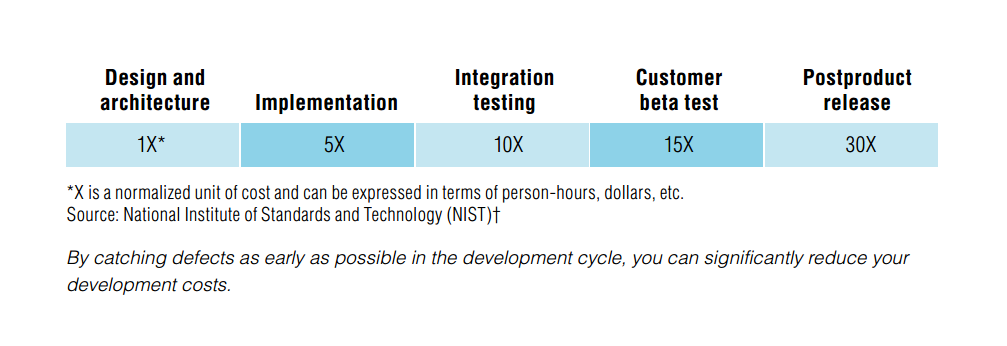Recommended Blogs
Why Tech Startups Should Not Ignore Software Testing Types

According to Statista, in 2012, testing and quality assurance consumed 18% of IT companies’ budget that has now reached to 39% and will be 40% in 2019.
Established companies h`ave started realizing the importance of software testing. However, there is a dire need for technology startups to follow the same. Technology startups often face uncertainties and funding roadblocks. However, there is a great reason for startups to opt Software Testing; and the reason is Quality.
Contents
- Limitations of a Technology Startup
- Major Goals and Objectives of Software Testing
- Software Testing Types that Shouldn’t Be Ignored
- Conclusion
While a few bugs early in the software development phase might not seem a big deal, but software defects are known to be costly post its product-release. In fact, IBM states that the cost of errors increases dramatically as your software solution progresses through the development cycle. It’s about 30 times more expensive to fix a bug after release than during the initial stages.

[Image Source – IBM]
Limitations of a Technology Startup
Just like any other enterprise, technology startups have their limitations and challenges in software testing. These include lack of budgets, time and resources that have to be allocated to testing. Let us discuss these challenges in detail.
1. Time:
There is a constant pressure for startups to release a Minimum Viable Product (MVP) fast to get quick returns. Most startups perceive releasing their product in the market and fixing the bugs later upon identified by users/market is a good idea. However, they fail to realize that post-production testing takes a lot of time as there is a need to rework on the same piece of code every time they make a change. Hence, more time is involved in finding and correcting bugs at this stage.
2. Resources:
Like every coin has two sides, startups also come with the excitement of learning something new and dealing with the constant pressure of wearing multiple hats. Most startups don’t have a dedicated department for testing, their development teams perform the necessary tests. Therefore, they might overlook some bugs due to the lack of dedicated resources for testing.
3. Budget:
Budget constraints are a harsh reality for startups, and this is the reason software testing is overlooked. Additional headcount means extra expenses. The cost associated with finding bugs posts the production stage is way higher than finding them during the development stage.
4. Thought Leadership:
Often, technology startups lack a Thought Leadership team having a strategic planning of QA activities. The tools to use, the number of resources to involve, the total amount of time QA activities consume and the overall costs are often overlooked by startups. This makes it difficult for technology startups to release a certain application.
Understanding how to overcome the above limitations can help technology startups define their strategy. Under no circumstances should software testing be overlooked or dismissed.
Major Goals and Objectives of Software Testing
– Finding defects in the software to allow a smooth process
– Evaluating the level of a product’s quality and informing the stakeholder
– Ensuring that the final results match business specifications and user requirements
– Increasing profit potential
– Gaining customer loyalty by offering a quality product
Software Testing Types that Shouldn’t Be Ignored
Here are a few types of software testing that should never be ignored:
Exploratory Testing
For a new application, exploratory testing is exceptionally important to lay the foundation of quality. Exploratory testing is an ad-hoc process, where the tester manually goes through the software in search of finding bugs.
Regression Testing
Testing is not a one-off process, every time a change is made to the code, there is a regression test to ensure the code has not broken the previous functioning features.
Performance Testing
Providing faster performance is the best way to establish a loyal user and vice versa. Application load time is an important factor that helps in keeping your users happy. The performance testing process ensures that the application loads quickly and can handle expected traffic.
Conclusion
When you are a new player in the market, quality will set you apart and help you grow. A simple formula to make your technology startup a hit is to keep your users happy and provide them with a seamless experience while they browse your application. Ignoring testing from your plan can probably cost you and your customers.
TestingXperts provide startups with unique plans according to their needs and in their budgets. Our core-flex models help in dealing with the inconsistent resource requirements of our startup clients. We offer flexible engagement models to facilitate our clients with optimized QA resource planning. This meets their fluctuating requirements at any time of their contract and saves unncessary budget leakage. Connect with us to have a unique software testing services plan for your startup.
Discover more
Stay Updated
Subscribe for more info

